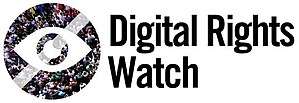Digital Rights Watch
 | |
| Formation | 2016 |
|---|---|
| Founded at | Melbourne, Australia |
| Type | NGO |
| Legal status | Charity |
| Purpose | Digital Rights |
| Website |
digitalrightswatch |
| Chair: Tim Singleton Norton | |
Digital Rights Watch is an Australian charity organisation founded in 2016[1] that aims to educated on and uphold the digital rights of Australian citizens.
In its inaugural year of operations, Digital Rights Watch responded to key Parliamentary and UN inquiries, ran several public campaigns and substantially increased its media footprint.[2]
History
In 2016, largely in response to the introduction of Australia's mandatory metadata retention scheme, Digital Rights Watch was created at a meeting of representatives from Australian human rights organisations, activists, political advisers, technology consultants and academics. To coordinate a civil society response to the metadata retention scheme as well as other key digital rights violations, a new organisation was founded with the aim of aligning and supporting existing efforts.
Structure
Digital Rights Watch is an incorporated Association, registered as a national charity with the Australian Charities and Not-For-Profits Commission. It is a member-run organisation, with a board of directors elected once a year at its Annual General Meeting. The organisation also operates an Advisory Council, which informs and advises on policy and strategy.
Digital Rights Watch is a member of the CIVICUS World Alliance for Citizen Participation, the Australian Digital Inclusion Alliance[3], and the global Keep It On campaign.[4]
Digital Rights Watch often works in partnerships with other Australian digital or human rights organisations such as the Human Rights Law Centre, Amnesty International Australia, CryptoAustralia, Electronic Frontiers Australia, the Australian Privacy Foundation, ACFID and others. Digital Rights Watch also works with international groups such as Access Now, Electronic Frontiers Foundation, Open Media, EDRi, Privacy International and others.
Campaigns
In August 2016, Digital Rights Watch coordinated a campaign, including media coverage[5], expressing concern over privacy issues raised in the Australian national census.[6]
On 13 April 2017, Digital Rights Watch declared a national day of action against mandatory data retention,[7] calling for all Australians to 'Get a VPN'.[8]
In August 2017, Digital Rights Watch hosted an event as part of the Melbourne Writers Festival in which they profiled the personal metadata footprint of Professor Gillian Triggs, former President of the Australian Human Rights Commission.[9]
In September 2017, Digital Rights Watch partnered with Privacy International to push for greater transparency over intelligence sharing operations between governments.
In October 2017, Digital Rights Watch's Chair Tim Singleton Norton received a special mention in the Access Now Global Heroes and Villains of Human Rights Awards.
In May 2018, Digital Rights Watch launched the State of Digital Rights report, outlining several ways that Australian citizen's digital rights are being eroded.[10]
References
- ↑ "Digital Rights Watch group launches to fight for "free and open Internet"". Delimiter. Delimiter. 16 March 2016. Retrieved 27 September 2017.
- ↑ "2016 Annual Report – Digital Rights Watch". digitalrightswatch.org.au. Retrieved 2017-09-27.
- ↑ "Australian Digital Inclusion Alliance". digitalinclusion.org.au. Retrieved 2017-09-27.
- ↑ "#KeepItOn". Access Now. Retrieved 2017-09-27.
- ↑ Norton, Tim Singleton (2016-08-05). "The census is too important to boycott, despite serious privacy concerns". The Sydney Morning Herald. Retrieved 2017-09-27.
- ↑ "Open letter from privacy advocates calls for inquiry into Census 2016 – Digital Rights Watch". digitalrightswatch.org.au. Retrieved 2017-09-27.
- ↑ http://digitalrightswatch.org.au/2017/04/12/get-a-vpn/
- ↑ "'Get a VPN' as metadata retention scheme deadline arrives, experts say". ABC News. 2017-04-13. Retrieved 2017-09-27.
- ↑ "Gillian Triggs Let Someone Have A Day's Worth Of Her Metadata To Show Why She Believes In Warrants". BuzzFeed. Retrieved 2017-09-27.
- ↑ "Data leaks a breach of Australian's human rights, report says". ABC News. 2018-05-14. Retrieved 2018-05-21.